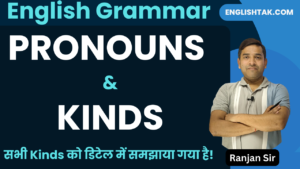![]()
Adjectives Rules in Hindi & English
इस पोस्ट को पढ़कर आप उदाहरण सहित हिंदी में विशेषण ‘Adjectives Rules in Hindi & English’ सीख सकते हैं। यदि आप उदाहरणों के साथ विशेषणों के नियमों पर ध्यान केंद्रित करते हैं; अंग्रेजी लिखते और बोलते समय आप अपने वाक्यों में विशेषणों का प्रयोग कर सकते हैं।
By reading this post, you can learn adjective in Hindi with examples. If you focus on the rules of adjectives with examples; you can use adjectives in your own sentences while writing and speaking English.
Adjective वह शब्द है जो किसी संज्ञा या सर्वनाम की विशेषता बतलाने के लिए प्रयोग किया जाता है। विशेषण वह शब्द है जो संज्ञा या सर्वनाम की विशेषताओं का वर्णन करता है। गुण का वर्णन करने वाले शब्द विशेषण कहलाते हैं। जैसा कि निम्नलिखित वाक्यों में उदाहरण सहित विशेषण के साथ समझाया गया है –
An Adjective is a word that is used to qualify a noun or pronoun. Or, Qualifying words are known as Adjectives. Adjective is a word that describes the characteristics of a Noun or Pronoun. The words that describe the attribute are called adjective. As explained in the following sentences with adjectives with examples –
Let’s see the sentence –
Rama is a brave girl in her school.
She is beautiful and intelligent.
(You can see; In these sentence both ‘beautiful’ and ‘intelligent’ are Adjectives and describing the specialty of Noun ‘Rama and She’.)
आप हमेशा याद रखें कि जब भी Adjective का प्रयोग किया जाता है; या तो इसका प्रयोग या तो Noun के पहले होगा या ‘be Verb – is, am, are, was, were, should be, has been, get, became etc’. के बाद होगा।
You will always remember that whenever Adjective is used; Either it will be used before the Noun or it will be followed by ‘be Verb – is, am, are, was, were, should be, has been, get, become, appear, feel, grow, look, seem, smell, sound, taste, etc’.
Here are some Adjectives with examples
रोहन का एक बड़ा घर है।
Rohan has a big house.
वह अब बहादुर हो गई है।
She has become brave now.
वह बहुत अमीर है।
He is very rich.
रीमा खूबसूरत लड़की नहीं है।
Rima is not a beautiful girl.
वह बचपन से ही समझदार रही है।
She has been intelligent since childhood.
Suggested For You |
|
| Grammar | EnglishTak YouTube Channel |
| Spoken English | Videos |
| Ranjan Sir Blog | Join Our WhatsApp Group |
Adjectives Rules in Hindi & English
KINDS OF ADJECTIVES
Gradable and Non-gradable adjectives
विशेषणों को दो वर्गों में विभाजित किया जा सकता है: शब्दों का एक बड़ा वर्ग जिसे वर्गीकृत किया जा सकता है (ग्रेडेबल विशेषण) और एक छोटा वर्ग जिसे वर्गीकृत नहीं किया जा सकता (गैर-ग्रेडेबल विशेषण)।
Adjectives can be divided into two classes: a large class of words which can be graded (gradable adjectives) and a small class that cannot be graded (non-gradable adjectives).
An adjective is gradable when:
a) we can imagine degrees in the quality referred to and so can use it with words like very, too and enough: very good, too good, less good, not good enough, etc.
b) we can form a comparative and superlative from it: (big), bigger, biggest; (good), better, best, etc.
An adjective is non-gradable when:
a) we cannot modify it (i.e. we cannot use it with very, too, etc.)
b) we cannot make a comparative or superlative from it: e.g. atomic, daily, dead, medical, unique, etc.
Attributive and Predicative Adjectives
गुणवाचक और विधेय शब्द किसी वाक्यांश या वाक्य में विशेषण की स्थिति को संदर्भित करते हैं। हम कहते हैं कि कोई विशेषण गुणवाचक होता है या संज्ञा के पहले आने पर गुणवाचक रूप से प्रयोग किया जाता है।
The terms attributive and predicative refer to the position of an adjective in a phrase or sentence. We say that an adjective is attributive or is used attributively when it comes before a noun:
an old ticket, a rich man, a young girl
जब Adjective का Verb के तुरंत बाद हो या कहें कि जब Adjective का प्रयोग Noun के तुरंत बाद नहीं किया जाता है।
We say that an adjective is predicative or that it is used predicatively when it comes directly after a verb such as:
a) be, become, seem
This ticket is old. Ann seems happy.
b) appear, feel, get/grow (= become), keep, look, make, smell, sound, taste, turn
Tom felt cold.
He got/grew impatient.
The idea sounds interesting.
He made me happy.
Adjectives can be subclassified according to whether they can function as:
1. Both Attributive and Predicative :
A hungry man – the man is hungry
2. attributive only, e.g.: former, latter, outer, upper, utter
What you say is utter nonsense.
3. Predicative only, e.g.: afloat, afraid, alight, alike, alive, ashamed, asleep, awake, content, far, glad, near, pleased, sorry, unable
The children were asleep at 7, but now they’re awake.
I am very glad to meet you.
Your hotel is quite near here. It isn’t far from here.
The restrictions of adjectives to attributive or predicative use are not always absolute. Some adjectives change their meaning when moved from one position to the other.
Your suitcase is very heavy. (i.e. in weight – predicative)
Paterson is a heavy smoker. (i.e. he smokes a lot – attributive)
You’re late again. (i.e. not on time – predicative)
My late uncle was a miner. (i.e. he’s dead now – attributive)
Agatha Withers is very old now. (i.e. in years – predicative)
Note that in many cases the suffix is what creates the adjective to begin with.
For example, the word accept is a verb. But when we add the adjective suffix –able to the verb, we get the adjective acceptable. In other words, these suffixes are both adjective marking and adjective forming.
Here is a list of some common adjective suffixes:
–able / –ible (acceptable, audible)
–al (autobiographical, beneficial)
–an / –ian (American, vegetarian)
–en (barren, broken)
–ful (careful, cheerful)
–ic (chronic, classic)
–ive (consecutive, conservative)
–less (cordless, countless)
–ous (curious, curvaceous)
–y (creepy, crummy)
Adjectives Rules in Hindi & English
Kinds of Adjectives in Hindi
1. Adjectives of Quality [गुणवाचक विशेषण]
2. Adjectives of Quantity [परिमाणवाचक विशेषण]
3. Adjectives of Number [संख्यावाचक विशेषण]
4. Demonstrative Adjectives [संकेतवाचक विशेषण]
5. Possessive Adjectives [सम्बन्धसूचक विशेषण]
6. Distributive Adjectives [वितरणवाचक विशेषण]
7. Interrogative Adjectives [प्रश्नवाचक विशेषण]
8. Proper Adjectives [व्यक्तिवाचक विशेषण]
9. Emphasizing Adjectives [बलाघातसूचक विशेषण]
10. Exclamatory Adjectives [विस्मयादिवोधक विशेषण]
Adjective in Hindi & English : – If you have read Adjective in Hindi & English till here, Then I sincerely hope that you must have understood well the definition and related terms of Adjectives and types of Adjective In Hindi. If you have any Problem/Doubt in this Article, then you can Ask Us through Comment. If you like this Article, Share it with your friends.
हिंदी और अंग्रेजी में विशेषण: – यदि आपने यहाँ तक हिंदी और अंग्रेजी में विशेषण पढ़ा है, तो मुझे पूरी उम्मीद है कि आप हिंदी में विशेषण और विशेषण के प्रकार की परिभाषा और संबंधित शब्दों को अच्छी तरह से समझ गए होंगे। अगर आपको इस आर्टिकल में कोई प्रॉब्लम/शंका है तो आप हमें कमेंट के जरिए पूछ सकते हैं। अगर आपको यह आर्टिकल पसंद आया हो तो इसे अपने दोस्तों के साथ शेयर करें।
Adjectives Rules in Hindi & English
Important Posts of English Grammar





